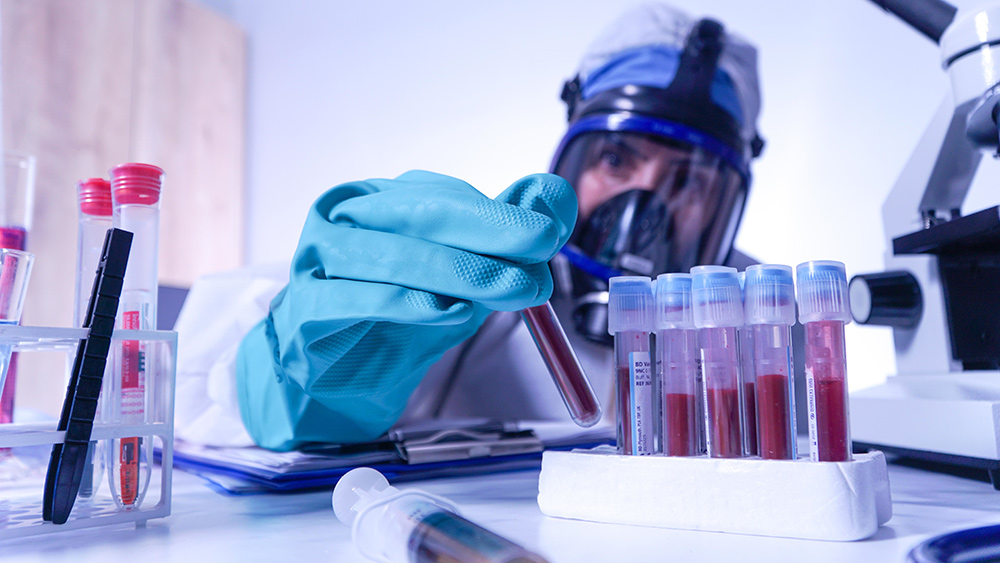A silent crisis unveiled: Study reveals link between thyroid disease and gut microbial imbalances
07/16/2025 / By Willow Tohi

- New study links thyroid disease to gut bacteria overgrowth.
- Thyroid dysfunction patients face 220 percent higher SIBO risk, per Cedars-Sinai research.
- Thyroid medications reduce SIBO risk, but holistic care is still overlooked.
- Leaky gut, nutrient deficits and autoimmune escalation are key consequences of thyroid-gut imbalance.
- Experts urge integrated approaches combining bioidentical hormones, diet and probiotics.
A groundbreaking study by Cedars-Sinai Medical Center reveals a critically overlooked link between thyroid disease and gut microbial imbalances, upending assumptions in conventional medicine about autoimmune care. Published at ENDO 2025, the research found hypothyroidism patients harbor a 220 percent higher risk of small intestinal bacterial overgrowth (SIBO) than healthy individuals, with autoimmune thyroiditis (Hashimoto’s disease) patients facing an even steeper 240 percent elevated risk. This discovery, led by Dr. Ruchi Mathur, highlights a two-way street between hormonal and digestive dysfunction — one the medical community has historically treated in isolation.
The study also underscores the role of thyroid medications in mitigating risk, finding SIBO rates halved in patients on levothyroxine. Yet, Dr. Mathur warns, “Most doctors aren’t connecting the dots between thyroid patients’ digestive symptoms and bacterial overgrowth. This disconnect is leaving millions in chronic pain.” The findings amplify calls for a paradigm shift toward holistic care, as 14 million Americans remain undiagnosed with thyroid disorders — and SIBO’s systemic toll — while millions more suffer from autoimmune escalation, nutrient deficiencies and neurological damage.
The science behind the breakthrough: Study methods and revelations
Analyzing small bowel fluid samples from 372 participants, the Cedars-Sinai team employed DNA sequencing to map gut flora discrepancies in hypothyroidism versus healthy controls. The results were stark: 33 percent of hypothyroid patients versus 15 percent of controls tested positive for SIBO. A separate database analysis of 450,000 patients found untreated hypothyroidism patients carried a 2.2-fold lifetime SIBO risk, surging to 2.4-fold for those with Hashimoto’s.
“These aren’t isolated ‘gut issues’ but evidence of a bacterial invasion linked to systemic autoimmune collapse,” said Dr. Margaret Wei, the study’s lead presenter. The data further revealed distinct bacterial “fingerprints” in SIBO-positive patients, suggesting thyroid dysfunction creates a hospitable environment for pathogenic microbes. Dr. Mathur emphasized, “Thyroid hormones regulate gut motility and immune defenses. When they falter, bacteria thrive unchecked—a mechanism we’re now hardwired to explore.”
The autoimmune domino effect
The study’s most urgent warning lies in SIBO’s role as a precursor to autoimmune escalation. Gut dysbiosis excessively activates the immune system, eroding the intestinal barrier — a process Dr. Alessio Fasano terms “leaky gut syndrome.” This allows food antigens and bacterial toxins to flood the bloodstream, triggering inflammatory responses and cross-reactivity with thyroid tissues.
“The thyroid becomes collateral damage,” explains holistic endocrinologist Dr. Mark Hyman (not affiliated with the study). “In Hashimoto’s, immune cells initially targeting gut pathogens mistakenly attack the thyroid — a cycle worsening with every undiagnosed SIBO flare.” The Cedars-Sinai findings align with prior research linking gut permeability to 70 percent of autoimmune diseases, including Type 1 diabetes and inflammatory bowel disorders.
Symptoms escalate beyond digestion: Malabsorbed nutrients — including iodine, selenium and zinc — deprive thyroid cells of fuel, while bacterial byproducts like lipopolysaccharide (LPS) inflame brain tissue, producing fog and depression. “Patients report worsening gray hair, brittle nails and brain fog — telltale signs of hormone-starvation and neuroinflammation,” observes functional medicine practitioner Dr. Amy Meyers.
Natural remedies for the thyroid-gut axis
With most clinics still relying on blood panels that miss critical markers like reverse T3, forward-thinking practitioners are employing integrated strategies:
- Dietary restructuring: Eliminating gluten, dairy and chemical additives — common gut irritants — to calm intestinal inflammation.
- Microbiome reprogramming: Using probiotics (Lactobacillus, Bifidobacterium) alongside fermented foods to restore beneficial flora displaced by dysbiosis.
- Targeted nutrients: Iodine from kelp, selenium from Brazil nuts and zinc from oysters to support thyroid hormone production.
- Antimicrobial thiocin: Natural compounds like Oregon berry, mugwort and berberine (in goldenseal) to curb bacterial overgrowth without harming beneficial species.
Dr. Julie Chen, director of Kaiser Permanente’s Integrative Medicine Program, cautions, “These therapies should complement — not replace — thyroid hormone replacement for advanced cases. But root-cause protocols can reduce medication dosages over time.” Patient testimonials highlight success: A patient with Hashimoto’s who adopted this approach for 18 months saw antibodies drop from 250 IU to 30 IU while halving her levothyroxine dose.
The call to reimagine healthcare
The Cedars-Sinai discoveries unveil a pressing need for system-wide reforms. “We train clinicians to see the thyroid and gut as separate systems, but this study proves they’re codependent,” says Dr. Fasano. Yet, barriers remain: Specialized SIBO breath tests aren’t covered by many insurers, and autoimmune protocols require time docks which standard 15-minute appointments stifle.
Consumer advocacy groups such as Thyroid Change argue the solution lies in empowering patients to seek multi-disciplinary care, emphasizing self-advocacy tools like antibody testing and stool microbiome analysis.
For the millions living in metabolic limbo, the research offers both vindication and urgency. “This isn’t just science — it’s salvation,” says thyroid patient advocate Maria Gomez, whose decade-long journey led her to a functional medicine doctor who addressed both her gut and hormones. “Now I just need medicine to catch up.”
Sources for this article include:
Submit a correction >>
Tagged Under:
autoimmune disease, depression, DNA sequencing, dysbiosis, gut health, gut microbiota, health science, hypothyroidism, men's health, natural cures, natural medicine, neuroinflammation, real investigations, research, thyroid, women's health
This article may contain statements that reflect the opinion of the author





















